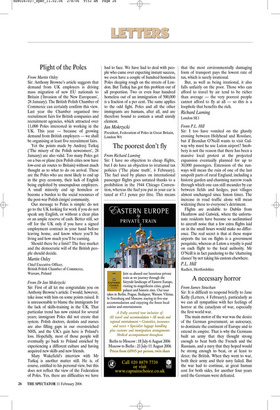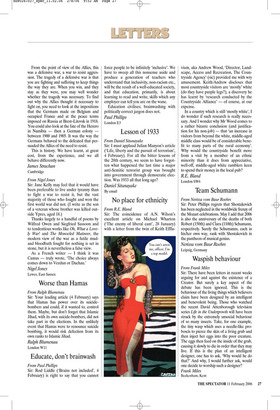A necessary horror
From James Strachan Sir: It is difficult to respond briefly to Jane Kelly (Letters, 4 February), particularly as we can all sympathise with her feelings of horror at the cataclysm of war, especially the first world war.
The main motor of the war was the desire of the German government, an autocracy, to dominate the continent of Europe and to extend its empire. That is why the Germans built an army that they thought strong enough to beat both the French and the Russians, and a navy that they hoped would be strong enough to beat, or at least to deter, the British. When they went to war, both their army and their navy failed. But the war had to continue, at great human cost for both sides, for another four years until the Germans were defeated. From the point of view of the Allies, this was a defensive war, a war to resist aggression. The tragedy of a defensive war is that you are fighting and suffering to keep things the way they are. When you win, and they stay as they were, you may well wonder whether the tragedy was necessary. To find out why the Allies thought it necessary to fight on, you need to look at the impositions that the Germans made on Belgium and occupied France and at the peace terms imposed on Russia at Brest–Litovsk in 1918. You could also look at the fate of the Herero in Namibia — then a German colony between 1900 and 1905. It was the way the Germans behaved to the defeated that persuaded the Allies of the need to resist.
This is history. We have learnt, at great cost, from the experience, and we all behave differently now.
James Strachan
Cambridge
From Nigel Jones Sir: Jane Kelly may feel that it would have been preferable to live under tyranny than to fight a war to resist it, but the vast majority of those who fought and won the first world war did not. (I write as the son of a veteran whose brother was killed outside Ypres, aged 18.) Thanks largely to a handful of poems by Wilfred Owen and Siegfried Sassoon and to tendentious works like Oh, What a Lovely War! and The Monocled Mutineer, the modern view of the war as a futile mudand bloodbath fought for nothing is set in stone, but it is nevertheless a false view.
As a French writer — I think it was Camus — truly wrote, ‘The choice always comes down to Verdun or Dachau.’
Nigel Jones
Lewes, East Sussex















































 Previous page
Previous page